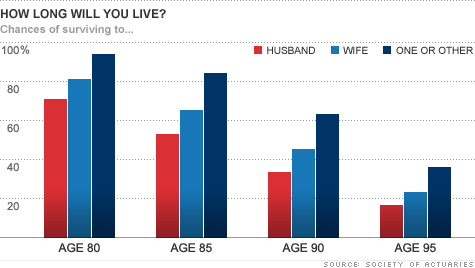Search News

(Money Magazine) -- A 65-year-old couple today faces an eight in 10 chance that one of them will live to 85; the chance that one will reach 97 is one in four.
Are you ready for a 30-year-plus retirement? "Most people don't think through their finances with an eye toward living that long," says adviser Robert DiQuollo. In a 2009 survey by the Society of Actuaries, only 7% of retirees said they are planning out for 20 years or more.
Among pre-retirees, just 13% are thinking two decades ahead.
Short-term thinking spawns a whole set of mistakes throughout your working life: not saving enough, not starting to save early, cashing out a 401(k) when you switch jobs.
Still, you have time to catch up. When you retire, the consequences of not planning for the long term can be dire: You're at risk of running through your money too fast. As a rough rule, once you start tapping your assets, you want to take out no more than 4% the first year and then adjust annually for inflation.
But in a 2008 MetLife Mature Market Institute survey, 43% of respondents said 10% or more was a reasonable draw-down rate. 'My biggest money mistake'
"It's not the first 15 years of retirement that's really a problem," says T. Rowe Price's Ritter. "But if you're not focused on how long you could live, the second 15 years are going to be scary."
That's particularly true when you're hit with a bear market early on, as many recent retirees were.
Even the conservative 4% rule can fail you: A T. Rowe study found that if your stock and bond portfolio loses money in the first five years of retirement, your chances of having money left after three decades falls from 89% to 43%. That's why you have to be flexible about withdrawals.?
You can't imagine yourself a day older. When you're 45 or 55, it's easy to deflect thoughts about your life at age 80 or 90. "The penalty for not following through isn't going to be felt for decades, says Ersner-Hershfield. "That makes it all the harder to focus on."
You're the guinea pig. A generation or two ago retirees didn't live as long as you should (the life expectancy of a 65-year-old has risen 32% since 1950). Plus, many had private pensions along with Social Security. Your reality couldn't be more different; not only has longevity increased, but you're going to be relying to a great extent on what you've managed to save in a 401(k). In 2009, 93% of private-sector workers bear some of the costs of saving for retirement; in 1979, 38% did.
Pull out old family photos. Looking at your future self -- gray hair, wrinkles, and all -- can spur smarter long-term choices. In a study by Ersner-Hershfield, people who were given a glimpse of their older selves chose a retirement savings rate 30% higher than the rate picked by those who didn't see an image.
Until you can age pictures of yourself -- something retirement experts like Ersner-Hershfield are hoping to help 401(k) plans do for you -- studying photos of a long-lived relative can be a persuasive prompt.
Run the numbers for 95. Take a spin through an online retirement calculator using age 95 as your target, and let the savings shortfall you're likely to see inspire you to save more.
If you're 50 or older, take advantage of catch-up contribution rules that let you sock away an extra $5,500 in your 401(k) and $1,000 more in your IRA each year. Have a money question? Ask The Help Desk ![]()
| Overnight Avg Rate | Latest | Change | Last Week |
|---|---|---|---|
| 30 yr fixed | 3.80% | 3.88% | |
| 15 yr fixed | 3.20% | 3.23% | |
| 5/1 ARM | 3.84% | 3.88% | |
| 30 yr refi | 3.82% | 3.93% | |
| 15 yr refi | 3.20% | 3.23% |
Today's featured rates: